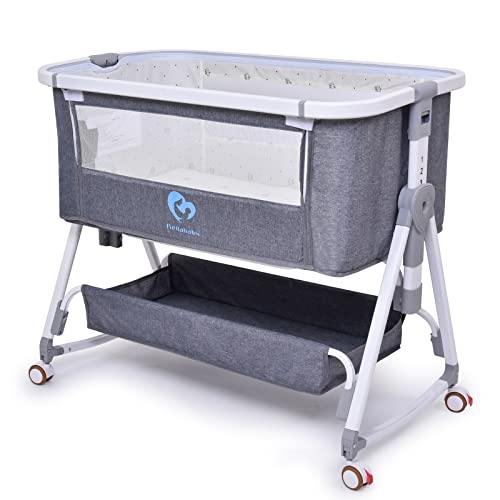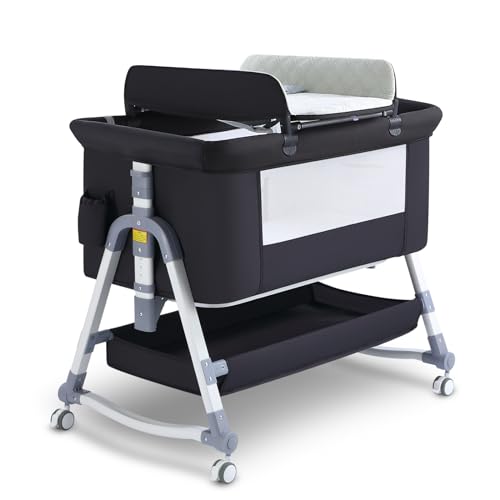The Best Bedside Cot Co Sleeper Tricks To Make A Difference In Your Li…
페이지 정보
작성자 Carla 작성일 25-01-17 07:59 조회 23 댓글 0본문
 Bedside Co-Sleeper - What is a bedside crib to cot Co-Sleeper?
Bedside Co-Sleeper - What is a bedside crib to cot Co-Sleeper?A bedside cot co sleeper is a bassinet which attaches to the side of your bed and allows you to reach for your baby in the middle of the night. This type of co-sleeping is recommended by the Lullaby Trust and NHS as it allows you to keep your baby close by without risking SIDS.
Peace of Mind
Co-sleeping can be a good option for parents. Some parents are concerned that sleeping next to their baby increases the risk of SIDS. However studies such as those published by NHS suggest the reverse. However, it's important to remember that co-sleeping requires sharing the same sleeping surface, and could increase the risk of SIDS if not executed in a proper manner. Co-sleeping beds in cots are designed to provide a safe middle ground between bed-sharing and separate sleeping areas that allow parents to be able to reach out over their child and gently soothe them without leaving the safety of their own bed.
Babies sleep best when they are fed and comforted frequently However, exhausted parents may find it difficult to leave their beds to feed or comfort them. A bedside cot co-sleeper allows parents to keep their infant in a safe distance and avoid the need to leave their comfy bed. The unique design of some co sleepers, like the SnuzPod also permits the four walls to zip down and turn the crib into a cradle, providing an extra layer of protection which makes it easier for parents who are tired to keep an eye on their newborn while remaining in the bed.
It is important to keep in mind that the risk of SIDS increases when a parent smokes (even with a co-sleeper) and when alcohol or drugs are consumed, even in small amounts. It's not a good idea to co-sleep with a baby if the father or mother has a history of having a snore. The NHS suggests that infants are put to sleep on their back to minimise the risk of accidental rolling and the risk of suffocation. A bedside travel crib cot or bassinet is the safest way to make sure this is done.
Safety
The NHS recommends that babies sleep in their own cribs rather than share your bed. This is due to the higher chance of suffocation and heat. Baby's in bed with their parents are more likely covered by pillows, blankets or sheets. This can cause SIDS. This is why a crib for bed is such a great solution. The close proximity of parents will ensure that the baby is not being suffocated or overheated, while being capable of being easily reached for feedings at night and comforting.
When the Dutch co-sleeping cot image first went viral four years ago parents across the globe were eager to own one to experience safe co-sleeping while their child was sleeping. Despite the excitement, doctors do not fully support the idea of a bed that connects to the side of an adult bed.
The main concern is that a parent may accidentally roll over an infant, causing strangulation or the child to suffocate. The risk is particularly high if a parent smokes, drinks alcohol or taking drugs while asleep. The risk of overheating, falling or even death are additional risks.
If you decide to opt for a wooden bedside cot mattress, it is essential to choose one that meets all safety standards. The mattress must be fitted without gaps and be prone sagging. It is also important to familiarize yourself with the weight limitations and age recommendations for sleepers.
All new bedside beds will have to comply with the new safety standard that was announced in November 2020. It replaces the earlier standards. Some stores may still have older models on sale however they are slowly disappearing as manufacturers switch to the new standards.
If you are considering purchasing a secondhand model, make sure it's in good shape. Check that the mechanism that secures the bed to the parent's bed is sturdy and doesn't leave a gap. You should also ensure that the mattress is placed in the sleeper without any gaps or bulges. Sheets should fit snugly too in order that the child cannot wriggle down inside and become trapped in a pocket or be at risk of suffocation.
Convenience
Many new parents feel a natural urge to be at their baby's side at night, however experts in sleep such as Lullaby Trust recommend avoiding bed-sharing. Using a bedside crib, or bassinet is a better option. They are made to be attached to the sides of a parent's bed, allowing the baby to remain close enough for feeding at night and providing comfort. This allows parents to rest comfortably at the end of the night without having to leave their bed.
Babies who have a separate bedroom are more likely than other children to experience pauses in their breathing (apnoea) and are also at an increased risk of SIDS. Research has proven that babies sleep better when they're in close to their parents. You can also quickly respond to any issue or concern your baby to make them feel more comfortable.
Choosing the Best Bedside Cot bassinet or bedside crib for your family will depend on a number of factors, including living situation and long-term plans. For instance, if are living with a spouse or household member who might also wish to use your bedside crib, it may be beneficial to consider convertible options that can grow into standalone cribs or toddler beds as your baby grows up. We suggest contacting us to inquire about this feature.
In addition to being a safe and convenient choice for new parents, the most significant benefit of a crib that is placed near the bed is that it encourages bonding between mother and child. Studies have proven that breastfeeding mothers tend to nurse longer when their baby's close. This leads to a stronger attachment between the two.
This is why a bedside cot has become so well-liked and is a great choice for any new mum who wants to keep their baby close by. But, prior to buying a bassinet, or co-sleeper it is important to check that it complies with all of the safe sleep and Lullaby Trust guidelines. It's also important to consider what your budget is, as there are options available at all prices.

댓글목록 0
등록된 댓글이 없습니다.
